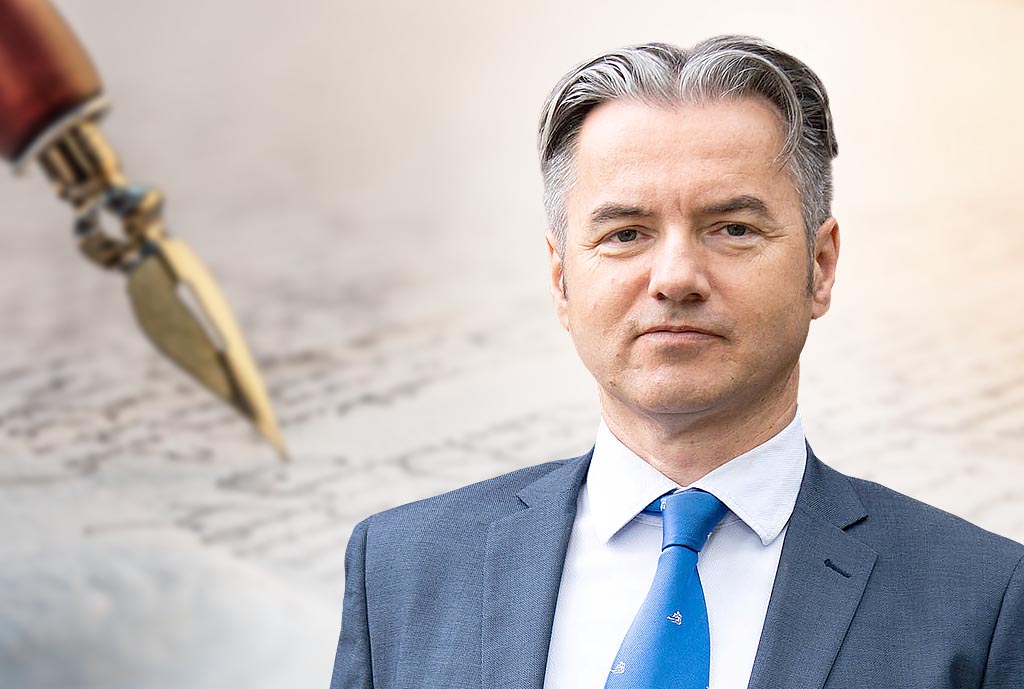By: Dr Metod Berlec
Prime Minister Robert Golob was criminally charged by the police, as first reported by TV Slovenia last Tuesday evening. The following day, the Specialised State Prosecutor’s Office announced that it had received “a criminal complaint from the police against an individual for the criminal offense of giving gifts for illegal mediation.”
This is an offense under the second paragraph of Article 264 of the Criminal Code, from the chapter on offenses against official duties, public powers, and public funds. The mentioned paragraph states that “anyone who promises, offers, or gives another person a reward, gift, or any other benefit for themselves or for someone else, with the intent to use their position or their real or assumed influence to intervene, in order to perform an official act that should not be performed or to avoid performing an official act that should or could be performed, shall be punished by imprisonment from one to six years and a fine.” This criminal complaint is, of course, related to the former Minister of the Interior, Tatjana Bobnar. At the end of 2022, she publicly accused Golob of illegal pressures on the work of the Ministry of the Interior and the police. During a parliamentary investigation hearing, Bobnar stated that Golob demanded “actions that were impermissible and unacceptable, as he directly interfered in police appointments.” She added, “For me to remain minister, someone would have to lose their job. He assumed that he could demand this from me because he is the prime minister, something I, as minister, could not accept.”
Golob responded angrily to this early on Wednesday morning with a theatrical press conference in the National Assembly, with his parliamentary group, the Gibanje Svoboda MPs, lined up behind him. Golob initially tried to present himself as a victim, saying that it had been three years since “the gassing of Ljubljana and the worst trampling on human rights in the history of independent Slovenia.” He claimed that he was the only politician indicted during this period, supposedly for interfering with police work. At the same time, he asserted that “this is not interference in police work, but a political battle with an ‘offended politician’, Tatjana Bobnar, who has pursued this issue since her resignation two years ago.” According to him, discussions about purging the police of Janša supporters between him and Bobnar were merely conversations between two politicians. However, he contradicted himself by revealing that he had spoken with Bobnar twice before the 2022 parliamentary elections. Previously, he had claimed it was only once, just before he submitted his list of ministerial nominees to the National Assembly that same year. He did not explain why, if the matter is so unproblematic, he has not responded to invitations from the National Assembly’s Commission for the Supervision of Intelligence and Security Services (KNOVS) and why he avoids testifying before the Commission for the Prevention of Corruption (CPC).
Golob concluded the press conference by stating that he believes in the rule of law and will respond to the allegations through legal channels. Nonetheless, later that day, prominent members of his parliamentary group, including the Gibanje Svoboda parliamentary leader Nataša Avšič Bogovič and her deputies, Tereza Novak and Lenart Žavbi, as well as Speaker of the National Assembly Urška Klakočar Zupančič, held two separate press conferences to express their support for him. They viewed the indictment as an attack on the prime minister and an attempt to undermine the government, with the Speaker of the National Assembly attempting to downplay the importance of the indictment by stating that indictments in preliminary criminal proceedings are not unusual. “Only the state prosecutor is authorised to decide on prosecution, and until a final court decision, the constitutional principle of the presumption of innocence applies.” Janez Janša, the president of SDS, analysed the situation on the social network X, commenting insightfully: “A noose around the neck of the prime minister and the Gibanje Svoboda party. Those who installed Golob and his movement can tighten it whenever they decide – be it 3, 6, 9, or 12 months from now, or just weeks before the regular election deadline in March 2026, when they will siphon off the last voters for the ‘new’ face. They can also loosen it temporarily and tighten it again later. As with any puppet, the selective ‘use’ of repressive organs is a fundamental tool of the deep state.”
Golob’s leadership style is becoming a burden for the entire transitional left. Its leader, Milan Kučan, recently told Večer that the problem lies with inexperienced, amateurish politicians. Experts believe that influential figures in the background have assessed that Golob’s incompetent and arrogant governance could ensure the return of the SDS leader to power. But Golob will not give up easily. The events described above show he does not intend to step down without a fight. But his time as prime minister may be running out…
